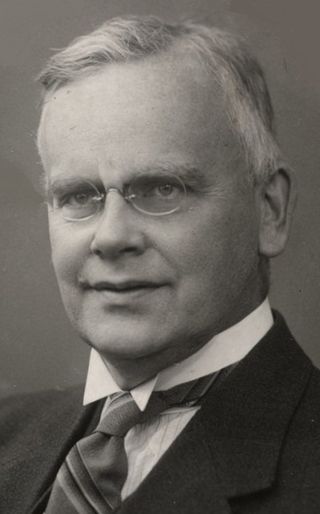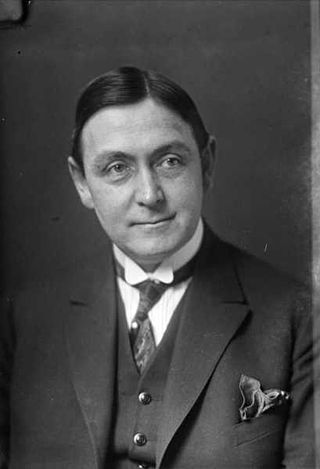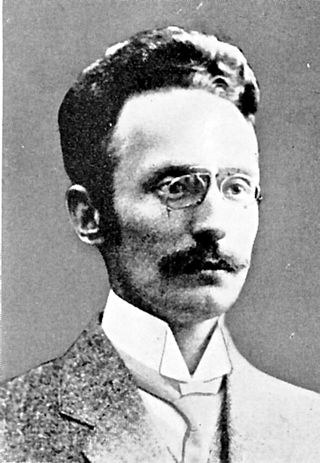Related Research Articles

Carl Joachim Hambro was a Norwegian journalist, author and leading politician representing the Conservative Party. A ten-term member of the Parliament of Norway, Hambro served as President of the Parliament for 20 of his 38 years in the legislature. He was actively engaged in international affairs, including work with the League of Nations (1939–1940), delegate to the UN General Assembly (1945–1956) and member of the Norwegian Nobel Committee (1940–1963).

Christian Krohg was a Norwegian naturalist painter, illustrator, author and journalist. Krohg was inspired by the realism art movement and often chose motifs from everyday life. He was the director and served as the first professor at the Norwegian Academy of Arts from 1909 to 1925.

Eilert Christian Brodtkorb Christie was a Norwegian architect.

Edvard Isak Hambro was a Norwegian legal scholar, diplomat and politician for the Conservative Party. He was the 25th President of the United Nations General Assembly (1970–1971).
Knut Helle was a Norwegian historian. A professor at the University of Bergen from 1973 to 2000, he specialized in the late medieval history of Norway. He has contributed to several large works.
Events in the year 1945 in Norway.
Events in the year 1913 in Norway.

Harald Gram was a Norwegian jurist, politician and genealogist. He was secretary general for the Conservative Party of Norway for 22 years, deputy mayor of Aker, member of Parliament from 1928 to 1936, and stipendiary magistrate in Oslo from 1936 to 1957. He was also noted for his work during World War II.

Fredrik Georg Gade was a Norwegian physician.

Edvard Bull was a Norwegian historian and politician for the Labour Party. He took the doctorate in 1912 and became a professor at the University of Kristiania in 1917, and is known for writings on a broad range of subjects. In addition to his academic work, he is known for his work on Norsk biografisk leksikon. His Marxist leanings inspired him to take up a parallel political career, in the Labour Party. Situated on the radical wing in the 1910s, he was among the architects as the Labour Party denounced the Twenty-one Conditions in 1923 and reunited with the social democrats in 1927. He was the deputy party leader from 1923 to 1932, and served as Norwegian Minister of Foreign Affairs in Hornsrud's short-lived cabinet in 1928.

Francis Bull was a Norwegian literary historian, professor at the University of Oslo for more than thirty years, essayist and speaker, and magazine editor.

Eivind Heiberg was a Norwegian engineer and railway director. He is known as the chairman of Skabo Jernbanevognfabrik from 1899 to 1924, the Federation of Norwegian Manufacturing Industries from 1906 to 1912, the Norwegian Employers' Confederation from 1912 to 1917, the Norwegian State Railways from 1924 to 1938 and Standards Norway from 1924 to 1934.

Lauritz Sand was a Norwegian topographer, military officer in the Dutch army, estate owner in the Dutch East Indies, business man and resistance pioneer of World War II. He was called the hardest tortured person in Norway during the war, and came to be an important symbol of the resistance against the Nazi regime.
Julius is a chimpanzee at Kristiansand Zoo and Amusement Park in Norway. As a baby, Julius was rejected by his mother, and was eventually adopted by the family of Edvard Moseid, the director of the zoo. The baby chimpanzee became the subject of a children's documentary on the Norwegian Broadcasting Corporation in 1981, and was soon the park's most popular attraction.
Anders Daae was a Norwegian-American physician.
Carl Joachim Hambro was a Norwegian novelist, journalist, essayist, translator and Romance philologist. The son of the Conservative politician C. J. Hambro, he embarked on a philological career, graduating in 1939. During the Second World War he lectured at Oslo Commerce School and the Norwegian College in Uppsala. After the war, he taught Norwegian at Sorbonne, and also started working as Paris correspondent for the Norwegian Broadcasting Corporation and a few Norwegian daily newspapers.
Alf Bøe was a Norwegian art historian, educator, curator and author.
Edvard Heiberg was a Norwegian director and engineer.

Julius Olavus Middelthun was a Norwegian sculptor and educator. He is most associated with his busts and statues.

Carl Frederik Diriks was a Norwegian maritime officer, lighthouse director and illustrator. He was born in Larvik to government minister Christian Adolph Diriks and Maren Cathrine Tax. He was uncle of Edvard Diriks, and father-in-law of county manager and government minister Nikolai Prebensen.
References
- 1 2 Skeie, Eyvind. "Edvard Moseid". In Helle, Knut (ed.). Norsk biografisk leksikon (in Norwegian). Oslo: Kunnskapsforlaget. Retrieved 18 February 2017.
- ↑ Godal, Anne Marit (ed.). "Edvard Moseid". Store norske leksikon (in Norwegian). Oslo: Norsk nettleksikon. Retrieved 18 February 2017.